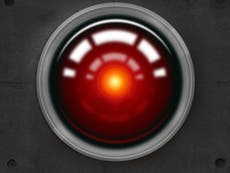Pope urges Catholics to pray that AI does not widen inequality
Francis warns robotics leading to ‘epochal change’ in society
Your support helps us to tell the story
From reproductive rights to climate change to Big Tech, The Independent is on the ground when the story is developing. Whether it's investigating the financials of Elon Musk's pro-Trump PAC or producing our latest documentary, 'The A Word', which shines a light on the American women fighting for reproductive rights, we know how important it is to parse out the facts from the messaging.
At such a critical moment in US history, we need reporters on the ground. Your donation allows us to keep sending journalists to speak to both sides of the story.
The Independent is trusted by Americans across the entire political spectrum. And unlike many other quality news outlets, we choose not to lock Americans out of our reporting and analysis with paywalls. We believe quality journalism should be available to everyone, paid for by those who can afford it.
Your support makes all the difference.Pope Francis has urged Catholics to pray that artificial intelligence (AI) does not rebel against humankind.
The pontiff, who made the appeal in his prayer intention for November, warned against rising inequality that could result from advanced robotics, and instead called for AI to work for everyone.
“Artificial intelligence is at the heart of the epochal change we are experiencing,” the Pope said. “Robotics can make a better world possible if it is joined to the common good.
“Indeed, if technological progress increases inequalities, it is not true progress. Future advances should be oriented towards respecting the dignity of the person and of creation.
“Let us pray that the progress of robotics and artificial intelligence may always serve humankind … we could say, ‘May it be human’.”
The pontiff’s monthly prayer intention, which is publicised by the Pope’s Worldwide Prayer Network, comes after the Vatican in February called for the ethical use of machine-learning technologies.
In a document titled “Rome Call for AI Ethics”, which was supported by the presidents of IBM and Microsoft, the Church calls on AI to work for the “benefit of humanity and the environment”.
The Pope’s warning comes after Elon Musk said that humans risk being overtaken by AI within the next five years.
The prediction marks a significant revision of previous estimations of “technological singularity”, when machine intelligence surpasses human intelligence and accelerates at an incomprehensible rate.
Experts such as noted futurist Ray Kurzweil previously pegged this super-intelligence tipping point at around 2045, citing exponential advances in technologies like robotics, computers and AI.
Mr Musk, whose ventures include electric carmaker Tesla and space firm SpaceX, said in an interview with The New York Times in July that current trends suggest AI could overtake humans by 2025.
“My assessment about why AI is overlooked by very smart people is that very smart people do not think a computer can ever be as smart as they are. And this is hubris and obviously false,” he said.
“We’re headed toward a situation where AI is vastly smarter than humans, and I think that time frame is less than five years from now. But that doesn’t mean that everything goes to hell in five years. It just means that things get unstable or weird.”



Join our commenting forum
Join thought-provoking conversations, follow other Independent readers and see their replies
Comments